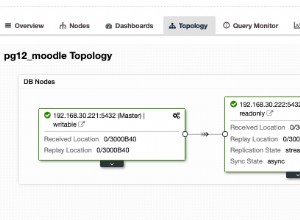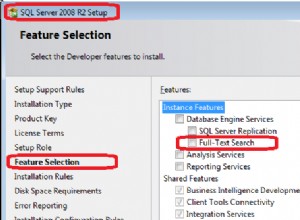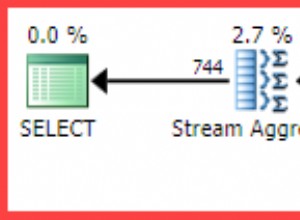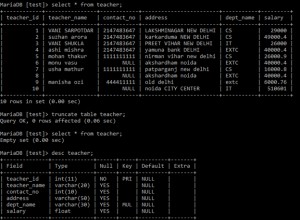Il meglio che sono stato in grado di fare è semplificare parte della query e cambiarla in una funzione con valori di tabella. Le funzioni scalari sono notoriamente scarse prestazioni e il vantaggio di un TVF in linea è che la definizione della query viene espansa nella query principale, proprio come una vista.
Questo riduce significativamente il tempo di esecuzione dei test che ho fatto.
ALTER FUNCTION dbo.FuzySearchTVF (@Reference VARCHAR(200), @Target VARCHAR(200))
RETURNS TABLE
AS
RETURN
( WITH N (n) AS
( SELECT TOP (ISNULL(CASE WHEN DATALENGTH(@Reference) > DATALENGTH(@Target)
THEN DATALENGTH(@Reference)
ELSE DATALENGTH(@Target)
END, 0))
ROW_NUMBER() OVER(ORDER BY n1.n)
FROM (VALUES (1), (1), (1), (1), (1), (1), (1), (1), (1), (1)) AS N1 (n)
CROSS JOIN (VALUES (1), (1), (1), (1), (1), (1), (1), (1), (1), (1)) AS N2 (n)
CROSS JOIN (VALUES (1), (1)) AS N3 (n)
WHERE @Reference IS NOT NULL AND @Target IS NOT NULL
), Src AS
( SELECT Reference = CASE WHEN DATALENGTH(@Reference) > DATALENGTH(@Target) THEN @Reference
ELSE @Reference + REPLICATE('_', DATALENGTH(@Target) - DATALENGTH(@Reference))
END,
Target = CASE WHEN DATALENGTH(@Target) > DATALENGTH(@Reference) THEN @Target
ELSE @Target + REPLICATE('_', DATALENGTH(@Target) - DATALENGTH(@Reference))
END,
WordLength = CASE WHEN DATALENGTH(@Reference) > DATALENGTH(@Target) THEN DATALENGTH(@Reference) ELSE DATALENGTH(@Target) END
WHERE @Reference IS NOT NULL
AND @Target IS NOT NULL
AND @Reference != @Target
), Scores AS
( SELECT seq = t1.n ,
Letter = SUBSTRING(s.Reference, t1.n, 1),
s.WordLength ,
LetterScore = s.WordLength - ISNULL(MIN(ABS(t1.n - t2.n)), s.WordLength)
FROM Src AS s
CROSS JOIN N AS t1
INNER JOIN N AS t2
ON SUBSTRING(@Target, t2.n, 1) = SUBSTRING(s.Reference, t1.n, 1)
WHERE @Reference IS NOT NULL
AND @Target IS NOT NULL
AND @Reference != @Target
GROUP BY t1.n, SUBSTRING(s.Reference, t1.n, 1), s.WordLength
)
SELECT [Score] = 100
WHERE @Reference = @Target
UNION ALL
SELECT 0
WHERE @Reference IS NULL OR @Target IS NULL
UNION ALL
SELECT CAST(SUM(LetterScore) * 100.0 / MAX(WordLength * WordLength) AS NUMERIC(5, 2))
FROM Scores
WHERE @Reference IS NOT NULL
AND @Target IS NOT NULL
AND @Reference != @Target
GROUP BY WordLength
);
E questo sarebbe chiamato come:
SELECT f.Score
FROM dbo.Customer AS c
CROSS APPLY [dbo].[FuzySearch]('First Name Middle Name Last Name', c.FirstName) AS f
Tuttavia è ancora una funzione abbastanza complessa e, a seconda del numero di record nella tabella dei clienti, penso che ridurlo a 1 secondo sarà un po' una sfida.




